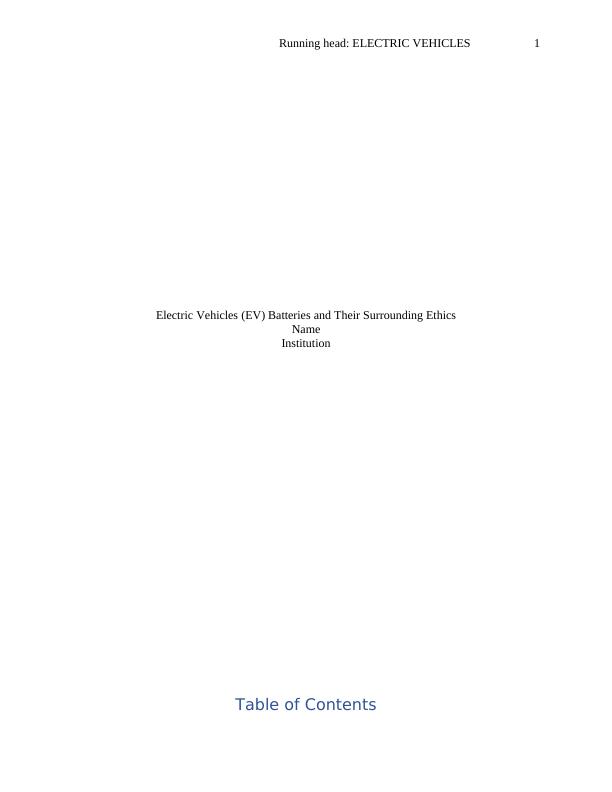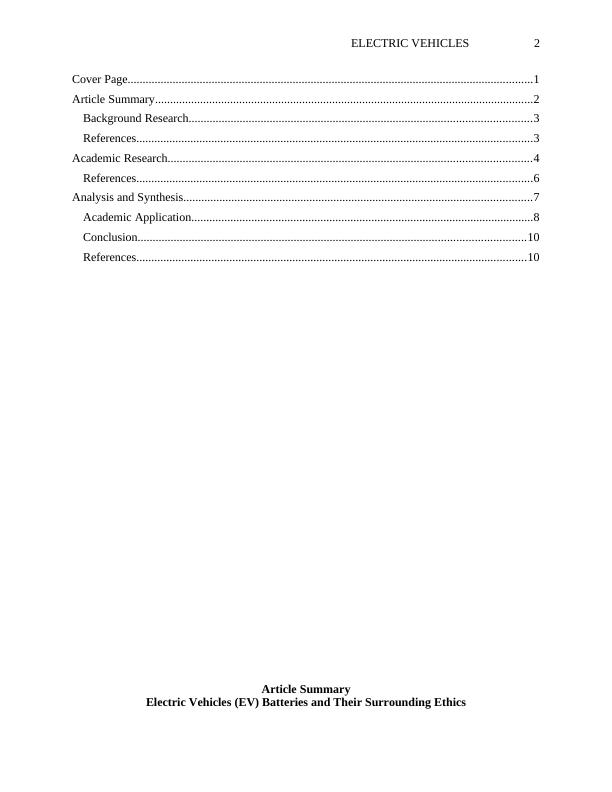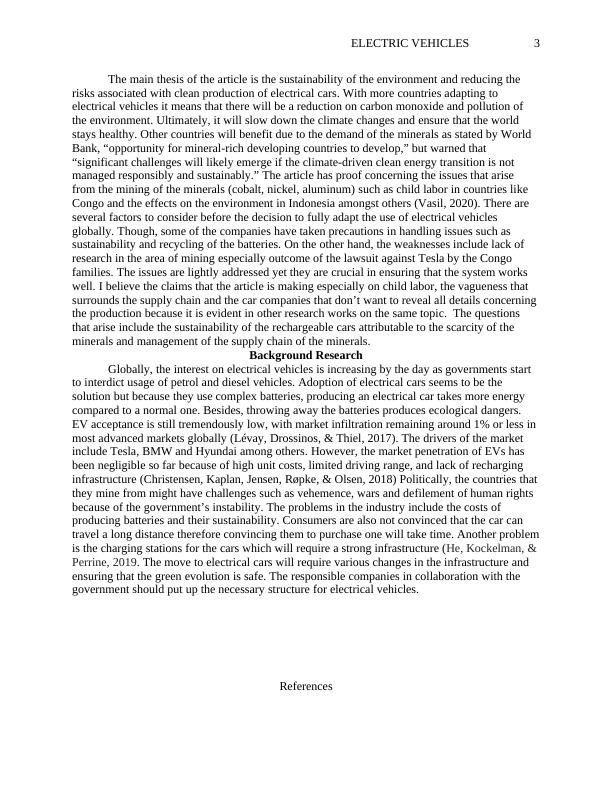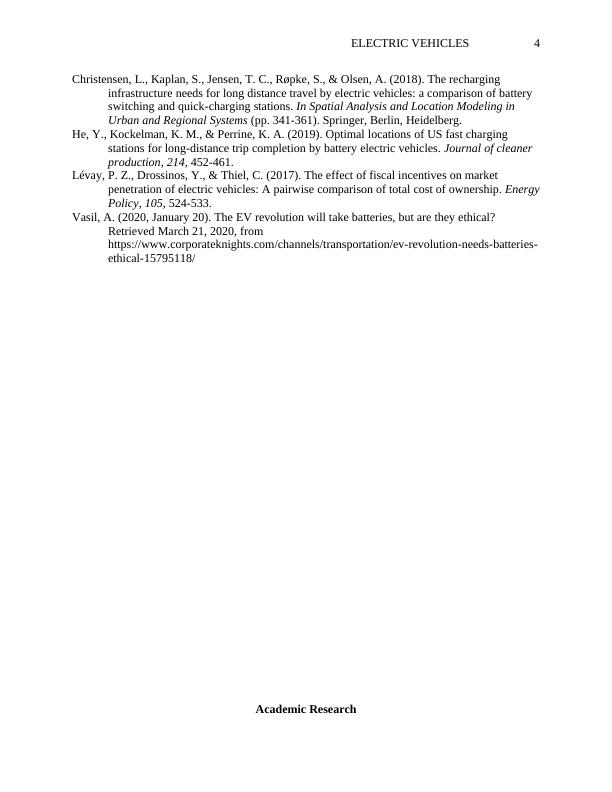Electric Vehicles (EV) Batteries and Their Surrounding Ethics
Added on 2022-08-17
11 Pages3691 Words37 Views
Running head: ELECTRIC VEHICLES 1
Electric Vehicles (EV) Batteries and Their Surrounding Ethics
Name
Institution
Table of Contents
Electric Vehicles (EV) Batteries and Their Surrounding Ethics
Name
Institution
Table of Contents

ELECTRIC VEHICLES 2
Cover Page.......................................................................................................................................1
Article Summary..............................................................................................................................2
Background Research..................................................................................................................3
References....................................................................................................................................3
Academic Research.........................................................................................................................4
References....................................................................................................................................6
Analysis and Synthesis....................................................................................................................7
Academic Application..................................................................................................................8
Conclusion.................................................................................................................................10
References..................................................................................................................................10
Article Summary
Electric Vehicles (EV) Batteries and Their Surrounding Ethics
Cover Page.......................................................................................................................................1
Article Summary..............................................................................................................................2
Background Research..................................................................................................................3
References....................................................................................................................................3
Academic Research.........................................................................................................................4
References....................................................................................................................................6
Analysis and Synthesis....................................................................................................................7
Academic Application..................................................................................................................8
Conclusion.................................................................................................................................10
References..................................................................................................................................10
Article Summary
Electric Vehicles (EV) Batteries and Their Surrounding Ethics

ELECTRIC VEHICLES 3
The main thesis of the article is the sustainability of the environment and reducing the
risks associated with clean production of electrical cars. With more countries adapting to
electrical vehicles it means that there will be a reduction on carbon monoxide and pollution of
the environment. Ultimately, it will slow down the climate changes and ensure that the world
stays healthy. Other countries will benefit due to the demand of the minerals as stated by World
Bank, “opportunity for mineral-rich developing countries to develop,” but warned that
“significant challenges will likely emerge if the climate-driven clean energy transition is not
managed responsibly and sustainably.” The article has proof concerning the issues that arise
from the mining of the minerals (cobalt, nickel, aluminum) such as child labor in countries like
Congo and the effects on the environment in Indonesia amongst others (Vasil, 2020). There are
several factors to consider before the decision to fully adapt the use of electrical vehicles
globally. Though, some of the companies have taken precautions in handling issues such as
sustainability and recycling of the batteries. On the other hand, the weaknesses include lack of
research in the area of mining especially outcome of the lawsuit against Tesla by the Congo
families. The issues are lightly addressed yet they are crucial in ensuring that the system works
well. I believe the claims that the article is making especially on child labor, the vagueness that
surrounds the supply chain and the car companies that don’t want to reveal all details concerning
the production because it is evident in other research works on the same topic. The questions
that arise include the sustainability of the rechargeable cars attributable to the scarcity of the
minerals and management of the supply chain of the minerals.
Background Research
Globally, the interest on electrical vehicles is increasing by the day as governments start
to interdict usage of petrol and diesel vehicles. Adoption of electrical cars seems to be the
solution but because they use complex batteries, producing an electrical car takes more energy
compared to a normal one. Besides, throwing away the batteries produces ecological dangers.
EV acceptance is still tremendously low, with market infiltration remaining around 1% or less in
most advanced markets globally (Lévay, Drossinos, & Thiel, 2017). The drivers of the market
include Tesla, BMW and Hyundai among others. However, the market penetration of EVs has
been negligible so far because of high unit costs, limited driving range, and lack of recharging
infrastructure (Christensen, Kaplan, Jensen, Røpke, & Olsen, 2018) Politically, the countries that
they mine from might have challenges such as vehemence, wars and defilement of human rights
because of the government’s instability. The problems in the industry include the costs of
producing batteries and their sustainability. Consumers are also not convinced that the car can
travel a long distance therefore convincing them to purchase one will take time. Another problem
is the charging stations for the cars which will require a strong infrastructure (He, Kockelman, &
Perrine, 2019. The move to electrical cars will require various changes in the infrastructure and
ensuring that the green evolution is safe. The responsible companies in collaboration with the
government should put up the necessary structure for electrical vehicles.
References
The main thesis of the article is the sustainability of the environment and reducing the
risks associated with clean production of electrical cars. With more countries adapting to
electrical vehicles it means that there will be a reduction on carbon monoxide and pollution of
the environment. Ultimately, it will slow down the climate changes and ensure that the world
stays healthy. Other countries will benefit due to the demand of the minerals as stated by World
Bank, “opportunity for mineral-rich developing countries to develop,” but warned that
“significant challenges will likely emerge if the climate-driven clean energy transition is not
managed responsibly and sustainably.” The article has proof concerning the issues that arise
from the mining of the minerals (cobalt, nickel, aluminum) such as child labor in countries like
Congo and the effects on the environment in Indonesia amongst others (Vasil, 2020). There are
several factors to consider before the decision to fully adapt the use of electrical vehicles
globally. Though, some of the companies have taken precautions in handling issues such as
sustainability and recycling of the batteries. On the other hand, the weaknesses include lack of
research in the area of mining especially outcome of the lawsuit against Tesla by the Congo
families. The issues are lightly addressed yet they are crucial in ensuring that the system works
well. I believe the claims that the article is making especially on child labor, the vagueness that
surrounds the supply chain and the car companies that don’t want to reveal all details concerning
the production because it is evident in other research works on the same topic. The questions
that arise include the sustainability of the rechargeable cars attributable to the scarcity of the
minerals and management of the supply chain of the minerals.
Background Research
Globally, the interest on electrical vehicles is increasing by the day as governments start
to interdict usage of petrol and diesel vehicles. Adoption of electrical cars seems to be the
solution but because they use complex batteries, producing an electrical car takes more energy
compared to a normal one. Besides, throwing away the batteries produces ecological dangers.
EV acceptance is still tremendously low, with market infiltration remaining around 1% or less in
most advanced markets globally (Lévay, Drossinos, & Thiel, 2017). The drivers of the market
include Tesla, BMW and Hyundai among others. However, the market penetration of EVs has
been negligible so far because of high unit costs, limited driving range, and lack of recharging
infrastructure (Christensen, Kaplan, Jensen, Røpke, & Olsen, 2018) Politically, the countries that
they mine from might have challenges such as vehemence, wars and defilement of human rights
because of the government’s instability. The problems in the industry include the costs of
producing batteries and their sustainability. Consumers are also not convinced that the car can
travel a long distance therefore convincing them to purchase one will take time. Another problem
is the charging stations for the cars which will require a strong infrastructure (He, Kockelman, &
Perrine, 2019. The move to electrical cars will require various changes in the infrastructure and
ensuring that the green evolution is safe. The responsible companies in collaboration with the
government should put up the necessary structure for electrical vehicles.
References

ELECTRIC VEHICLES 4
Christensen, L., Kaplan, S., Jensen, T. C., Røpke, S., & Olsen, A. (2018). The recharging
infrastructure needs for long distance travel by electric vehicles: a comparison of battery
switching and quick-charging stations. In Spatial Analysis and Location Modeling in
Urban and Regional Systems (pp. 341-361). Springer, Berlin, Heidelberg.
He, Y., Kockelman, K. M., & Perrine, K. A. (2019). Optimal locations of US fast charging
stations for long-distance trip completion by battery electric vehicles. Journal of cleaner
production, 214, 452-461.
Lévay, P. Z., Drossinos, Y., & Thiel, C. (2017). The effect of fiscal incentives on market
penetration of electric vehicles: A pairwise comparison of total cost of ownership. Energy
Policy, 105, 524-533.
Vasil, A. (2020, January 20). The EV revolution will take batteries, but are they ethical?
Retrieved March 21, 2020, from
https://www.corporateknights.com/channels/transportation/ev-revolution-needs-batteries-
ethical-15795118/
Academic Research
Christensen, L., Kaplan, S., Jensen, T. C., Røpke, S., & Olsen, A. (2018). The recharging
infrastructure needs for long distance travel by electric vehicles: a comparison of battery
switching and quick-charging stations. In Spatial Analysis and Location Modeling in
Urban and Regional Systems (pp. 341-361). Springer, Berlin, Heidelberg.
He, Y., Kockelman, K. M., & Perrine, K. A. (2019). Optimal locations of US fast charging
stations for long-distance trip completion by battery electric vehicles. Journal of cleaner
production, 214, 452-461.
Lévay, P. Z., Drossinos, Y., & Thiel, C. (2017). The effect of fiscal incentives on market
penetration of electric vehicles: A pairwise comparison of total cost of ownership. Energy
Policy, 105, 524-533.
Vasil, A. (2020, January 20). The EV revolution will take batteries, but are they ethical?
Retrieved March 21, 2020, from
https://www.corporateknights.com/channels/transportation/ev-revolution-needs-batteries-
ethical-15795118/
Academic Research

End of preview
Want to access all the pages? Upload your documents or become a member.
Related Documents
The Popularity of Electric Vehicles in UKlg...
|10
|2179
|230
Barriers of Deploying Electrical Cars Assignment 2022lg...
|35
|7765
|18
Building A Sustainable Organisationlg...
|10
|2879
|299
Electric Vehicles: Pros and Conslg...
|10
|3521
|437
MAHINDRA EVS SUSTAINABILITY CHALLENGE.lg...
|16
|3082
|169
Building a Sustainable Organization: Critical Analysis of the Electric Vehicle Industrylg...
|13
|2577
|481
